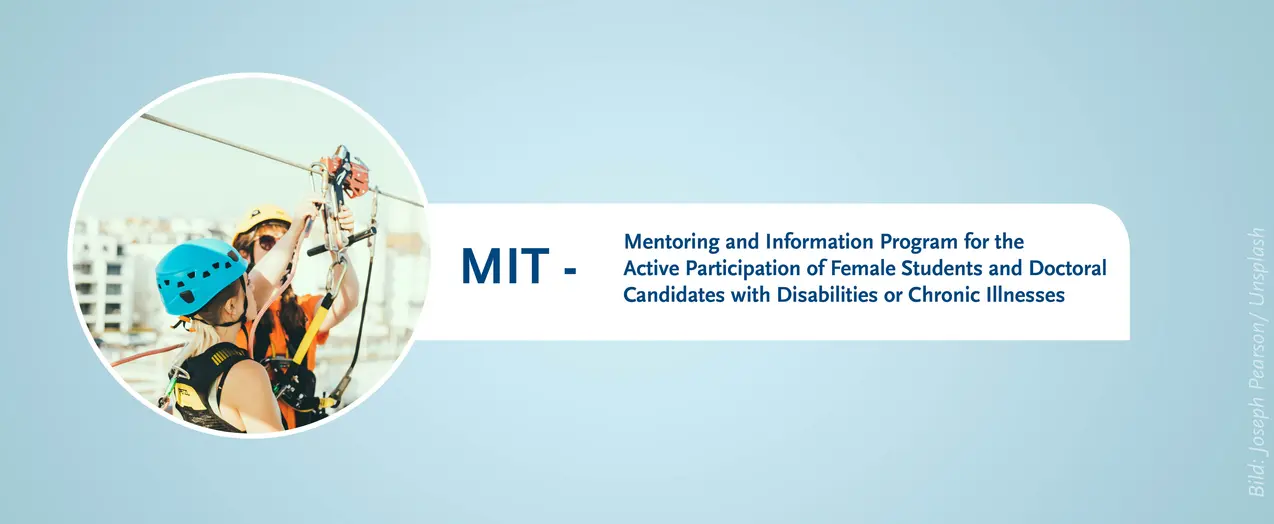MIT is aimed at female students and early-career researchers who want to pursue a doctorate despite a disability or chronic illness. With the help of MIT, you can be paired with a suitable mentor from the University of Bamberg and take part in a framework program that provides information on how to arrange your doctoral studies. MIT thus aims to help its mentees in the pursuit and completion of their PhD. In addition, this program provides a space for mentees to discuss the challenges of living with a disability or chronic illness while working on a PhD. MIT is a cooperation of the Women's Office, the Contact Point for Studying with Disabilities at the University of Bamberg, and the gender-sensitive Fachkolleg Inklusion an Hochschulen of the Hildegardisverein e.V.
Please Note: We encourage everyone, regardless of German language knowledge, to participate in this program. However, while you are welcome to find a mentor who will work with you in English, the events and correspondence of the program will be conducted in German. For this reason, German proficiency is extremely beneficial.
Why MIT?
Although the number of female students and female students with disabilities and chronic illnesses is steadily growing, there are fewer and fewer women and people with disabilities in academia the higher you look on the career ladder. According to the best2 study conducted by the German National Association for Student Affairs (Deutsches Studentenwerk) in 2017, one of the main problems experienced by students with disabilities is that they are often excluded from learning opportunities outside of the regular classroom. This might seem banal, but it isn't, because it also means that they are excluded from learning about how the larger system of the university works—knowledge which is absolutely vital to a successful academic career. This lack of opportunity and the consequent lack of insider knowledge also creates a barrier for women more often than for men. Therefore, female students with disabilities face a double barrier in terms of accessing the kind of systemic knowledge they need to advance within the university system. MIT was initiated to help these students overcome such barriers.
What is Mentoring?
Mentoring is a term for a non-hierarchical relationship of guidance and support between an experienced researcher and a student. The confidentiality of this partnership is guaranteed by a confidentiality agreement.
What are the Benefits of MIT?
MIT helps the sponsored female students and doctoral candidates (mentees) get in touch with a mentor. Additionally, MIT provides opportunities for the exchange of experiences and advice among the mentees through a framework program of lectures and workshops.
Through the mentoring relationship, the participating students and doctoral candidates are encouraged and supported in their efforts to complete a PhD while facing the additional challenges of a disability or chronic illness.
The support program also aims to provide background information about the university system and academic life in order to help participants advance their academic careers. At the same time, it provides spaces and opportunities for mentees to exchange experiences about the challenges of pursuing a PhD with a disability or chronic illness.
Framework Program
The framework program includes eight events within an eighteen-month period. Three of these events are mentee meetings, which are designed as biographical circles in the sense of the Fachkolleg Inklusion. In addition, there are four workshops complementing the discussions from the biography circles with relevant information for women who want to pursue or are pursuing a PhD with an impairment.
Possible workshop topics include:
- Disability accommodations in master’s and doctoral studies
- Writing an exposé
- Becoming a professor
- Creating your own academic homepage
At the end of the MIT sponsorship, the mentees organize an event in cooperation with the program coordinator at which the mentees themselves act as speakers.
Duration
The duration of the program is 18 months. In each round, up to 10 female students and doctoral candidates can be accepted into the program.

MIT is a cooperation of the Women's Office, the Contact Point for Studying with Disabilities at the University of Bamberg, and the gender-sensitive Fachkolleg Inklusion an Hochschulen of the Hildegardisverein e.V.
